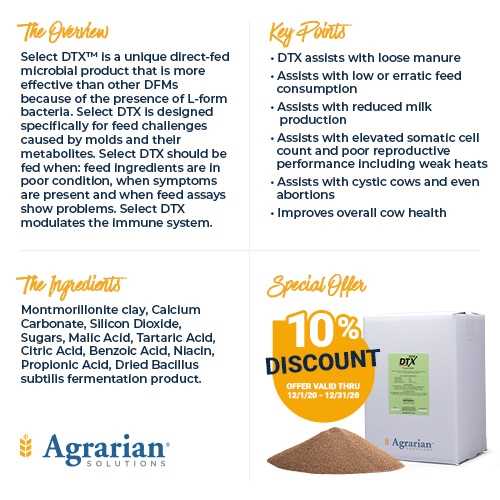Great Expectations...for Mycotoxins

John Doerr, Ph.D., PAS, Dpl. ACAP - Vice President, Science and Technology - Agrarian Solutions
Charles Dicken’s classic novel, Great Expectations, is a coming-of-age story, which, through successes and failures of its characters, advances some important moral truths. Sure, just what you ponder each morning as the cows are being milked! But I can offer a parallel.
Not many years ago, we were in the era of feed preservatives. That was how we fought molds and mycotoxins. Now, we’re truly in a coming-of-age of binders and other additives to control those poisons that so often harm our herds and our bottom line. With the first alumino-silicate effective against aflatoxin, the market was deluged overnight with all kinds of clay products, good or bad, assuring us they would bind that toxin. Then, with the realization that too many other toxins exist, came the claims that those same clays could bind them all. Others cried foul and substituted yeast cell fractions as the answer. And with them all came great expectations. We’re finally going to conquer mycotoxins.
When that proved wrong, two others took radically different approaches. One said, let’s use the clay as a foundation for aflatoxin but develop a really good enzyme to destroy each other kind of mycotoxin. They are a major world player today in combating these fungal poisons, but they are also limited in that there are many more active mycotoxins than there are toxin-specific enzymes (and multiple enzymes aren’t cheap!). The other group said, wait! The complexity of trying to succeed with a chemical approach is overwhelming. Let’s pursue a biological avenue.
While everyone knew that one major function of an animal’s liver was detoxifying foreign chemicals, we also knew that wasn’t sufficient protection. In the mid-90's we learned that the intestinal cells of animals have another system that can reject mycotoxins. And we discovered we could prompt that system to turn on earlier and work harder in the face of whatever mycotoxin was thrown it's way. That biological approach is offered in the form of Select DTX™.
Great expectations? A biological approach that bypasses any need to account for a specific chemical structure of a mycotoxin; a very broad spectrum control against a multitude of common mycotoxins that occur in combinations in feeds; a cost basis that ultimately proves more economical than products that handle just one or two toxins; and lots of real farm conditions data showing success against aflatoxins, DON, T-2, fumonisins, zearalenone, and even ergot alkaloids; that’s pretty much out in the forefront of mitigation methods! And, while not our original intent, DTX is a biologic, and it has very positive interactions with the cow’s immune system. For you, that means that even if the toxin burden drops off, the immune function advantages continue to benefit the herd.
If you contact your Select Sires or Agrarian representative right now, you’ll find a really attractive promotional pricing available to you just for December. Let your great expectations come to fruition. Select DTX™...the one that’s come of age!

